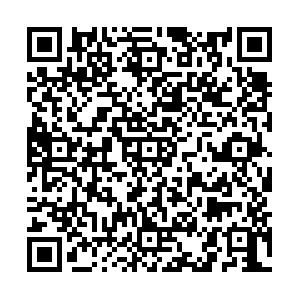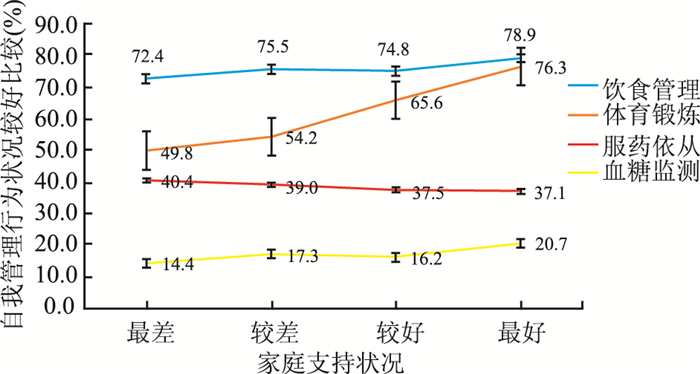Association between family support and self-management behavior among patients with type 2 diabetes mellitus in China
-
摘要:
目的 调查山东省2型糖尿病患者的家庭支持现状,分析家庭支持与患者自我管理行为之间的关系,为患者自我管理行为干预提供依据。 方法 采用多阶段分层随机抽样的方法,选取山东省4个地市的2 520名2型糖尿病进行问卷调查;运用非条件Logistic回归分析探索家庭支持与不同自我管理行为之间的关系。 结果 患者家庭支持的平均得分为(16.3±5.3)分;患者进行饮食控制、体育锻炼、服药依从和血糖监测(≥ 1次/周)的比例分别为75.4%、61.6%、38.5%和17.1%。Logistic分析结果显示,家庭支持得分越高,患者进行饮食控制、体育锻炼和血糖监测的可能性越大,OR值分别1.03(95%CI:1.01~1.05,P < 0.001)、1.07(95%CI:1.06~1.09,P < 0.001)和1.03(95%CI:1.01~1.04,P < 0.05);但家庭支持对患者服药依从行为的影响差异无统计学意义(P=0.68)。 结论 家庭支持对患者的饮食控制、体育锻炼和血糖监测的行为有着作积极的作用,但对患者服药依从的作用较小;应探索构建医疗机构-社区-家庭全面的自我管理支持模式。 Abstract:Objective To evaluate the relationship between family support and self-management behaviors among patients with type 2 diabetes mellitus (T2DM) in Shandong province, China. Methods A multi-stage stratified random sampling was used and 2 520 patients with T2DM were selected from urban and rural and communities in Shandong province. The correlation between family support and self-management behavior were analyzed using logistic regression analysis. Results A total of 1 866 patients with T2DM prescribed with drug were included for analysis, comprising 938 patients from urban areas and 928 patients from rural area.The mean C-DFBC scores were (16.3±5.3).The Logistic regress analysis revealed that the family support was associated with the dietary control (OR=1.03, 95%CI: 1.01-1.05, P < 0.001), physical excise (OR=1.07, 95%CI: 1.06-1.09, P < 0.001) and blood monitoring(OR=1.03, 95%CI: 1.01-1.04, P < 0.05))but not with medication adherence (P=0.68). Conclusion The family support can improve the self-management indietary control, physical excise and blood monitoring. -
Key words:
- T2MD /
- Family support /
- Self-management behavior /
- Shangdong Province
-
表 1 调查患者的基本特征状况
Table 1. The characteristic of the patients with type 2 diabetes mellitus in Shandong province
变量 频数 频率(%) 城乡 城市 938 50.3 农村 928 49.7 性别 男 637 34.1 女 1 229 65.9 年龄组(岁) 35~ 100 5.4 50~ 849 45.5 65~79 917 49.1 婚姻状况 非在婚 246 13.2 在婚 1 620 86.8 文化程度 未接受过教育 611 32.7 小学 613 32.9 初中及以上 642 34.4 人均家庭收入a (元) < 2 950 461 24.7 2 950~ 518 27.8 6 000~ 442 23.7 ≥12 000 445 23.8 患病时长(年) < 5 630 33.8 5~ 606 32.5 > 10 630 33.8 并发症 有 1 153 61.8 无 713 38.2 饮食控制 是 1 406 75.4 否 460 24.7 体育锻炼 是 1 149 61.6 否 717 38.4 服药依从 是 718 38.5 否 1 148 61.5 血糖监测 是 319 17.1 否 1 547 82.9 家庭成员支持得分 16.3±5.3 注:a人均家庭收入依据四分位间距划分。 表 2 2型糖尿病患者不同自我管理行为的多因素Logistic回归分析结果
Table 2. The influencing factors of self-management behavior of patients with T2DM by Logistic regression analysis
变量 单因素模型 多因素模型 OR(95%CI)值 P值 OR(95%CI)值 P值 饮食控制 家庭支持得分 1.07(1.05~1.10) < 0.01 1.03(1.01~1.05) < 0.001a 性别 男 1.00 1.00 女 1.81(1.46~2.25) < 0.01 1.78(1.40~2.27) < 0.001a 年龄(岁) 35~ 1.00 1.00 50~ 1.75(1.14~2.71) 0.011 1.57(1.00~2.47) 0.050 65~79 1.98(1.28~3.05) 0.002 1.74(1.10~2.77) 0.020* 文化程度 文盲/半文盲 1.00 1.00 小学 0.80(0.62~1.05) 0.110 0.97(0.73~1.29) 0.831 初中及以上 0.70(0.54~0.90) 0.007 1.02(0.74~1.39) 0.922 体育锻炼 家庭支持得分 1.08(1.06~1.10) < 0.001 1.07(1.06~1.09) < 0.001a 地区 城市 1.00 1.00 农村 0.66(0.55~0.80) < 0.001 0.74(0.61~0.91) 0.011a 性别 男 1.00 1.00 女 0.72(0.59~0.87) 0.001 0.90(0.72~1.13) 0.382 文化程度 文盲/半文盲 1.00 1.00 小学 1.43(1.14~1.80) 0.002 1.28(1.00~1.64) 0.049a 初中及以上 2.02(1.60~2.54) < 0.001 1.80(1.36~2.38) < 0.001a 人均家庭收入(元) < 2 800 1.00 1.00 2 800~ 1.11(0.86~1.45) 0.422 1.05(0.80~1.37) 0.744 6 000~ 1.33(1.02~1.73) 0.033 1.09(0.82~1.46) 0.556 ≥12 000 1.63(1.25~2.13) < 0.001 1.34(1.00~1.80) 0.046 患病时长(年) < 5 1.00 1.00 5~ 1.07(0.85~1.34) 0.553 1.07(0.85~1.36) 0.562 > 10 1.37(1.09~1.72) 0.008 1.37(1.07~1.75) 0.013a 服药依从 家庭支持得分 0.99(0.98~1.01) 0.446 1.00(0.98~1.01) 0.678 年龄组别(岁) 35~ 1.00 1.00 50~ 1.51(0.94~2.42) 0.090 1.51(0.93~2.45) 0.094 65~79 2.42(1.51~3.87) < 0.001 2.49(1.53~4.06) < 0.001a 血糖监测 家庭支持得分 1.02(1.00~1.04) 0.030 1.01(1.00~1.02) 0.009 地区 城市 1.00 1.00 农村 0.34(0.26~0.45) < 0.001 0.36(0.27~0.49) < 0.001a 性别 男 1.00 1.00 女 0.65(0.51~0.83) 0.001 0.75(0.56~0.99) 0.164 文化程度 文盲/半文盲 1.00 1.00 小学 1.04(0.75~1.45) 0.816 0.73(0.51~1.04) 0.373 初中及以上 2.10(1.56~2.84) < 0.001 1.22(0.81~1.74) 0.127 人均家庭收入(元) < 2 800 1.00 1.00 2 800~ 1.47(0.99~2.2) 0.058 1.23(0.81~1.85) 0.595 6 000~ 1.8(1.23~2.65) 0.003 1.18(0.79~1.79) 0.346 ≥12 000 2.9(2.01~4.19) < 0.001 1.79(1.21~2.66) < 0.001a 患病时长(年) < 5 1.00 1.00 5~ 1.39(1.01~1.93) 0.046 1.19(1.10~0.95) 0.101 > 10 2.09(1.54~2.84) < 0.001 1.27(1.13~1.41) < 0.001a 并发症 无 1.00 1.00 有 1.37(1.07~1.75) 0.013 1.01(1.02~1.04) 0.023a a表示P<0.05。 -
[1] World Health Organization. Global Report on Diabetes[R]. Geneva: World Health Organization, 2016. [2] Aschner P. New IDF clinical practice recommendations for managing type 2 diabetes in primary care[J]. Diabetes Res Clin Pract, 2017, 132(2017): 169-170. DOI: 10.1016/j.diabres.2017.09.002. [3] 刘薇薇, 王媛媛, 陈君逸, 等. 北京市社区糖尿病患者自我管理现况调查[J]. 中国全科医学, 2013, 16(13): 1167-1169. DOI: 10.3969/j.issn.1007-9572.2013.10.027.Liu WW, WangYY, Chen JY, et al. Status of self-management among diabetes patients in Beijing communities[J]. Chin Gen Prac, 2013, 16(13): 1167-1169. DOI: 10.3969/j.issn.1007-9572.2013.10.027. [4] Pamungkas R, Chamroonsawasdi K, Vatanasomboon P. A systematic review: family support integrated with diabetes self-management among uncontrolled type Ⅱ diabetes mellitus patients[J]. Behav Sci, 2017, 7(3): 62-79. DOI: 10.3390/bs7030062. [5] 刘冬梅, 游书秋, 李胜玲, 等. 社区老年糖尿病患者家庭功能与自我管理行为相关性研究[J]. 重庆医学, 2015, 44(7): 893-895. DOI: 10.3969/j.issn.1671-8348.2015.07.010.Liu DM, You SQ, Li SL, et al. Relationship between self-management behaviors and family functions among elderly patients with diabetes in community[J]. Chongqing Med, 2015, 44(7): 893-895. DOI: 10.3969/j.issn.1671-8348.2015.07.010. [6] Morad A, Bapeer H, Saeed S, et al. Impacts of self-management education on glycaemic control in patients with type 2 diabetes mellitus[J]. Diabetes MetabSyndr, 2018: S1871402118302145. DOI: 10.1016/j.dsx.2018.06.007. [7] 中华医学会糖尿病学分会. 中国2型糖尿病防治指南(2013年版)[J]. 中华内分泌代谢杂志, 2014, 30(10): 893-942. DOI: 10.3760/cma.j.issn.1000-6699.2014.10.020.Chinese diabetes association. Guidelines for the prevention and treatment of type 2 diabetes in China (2013)[J]. Chin J Diabetes, 2014, 30(10): 893-942. DOI: 10.3760/cma.j.issn.1000-6699.2014.10.020. [8] 刘延锦, 高欢欢. 中文版糖尿病患者家庭成员行为量表的信效度检测[J]. 护理学杂志, 2015, 30(19): 17-19. DOI: 10.3870/j.issn.1001-4152.2015.19.017.Liu YM, Gao HH. Reliability and validity of Chinese version of diabetes family behavior checklist[J]. J Nur Sci, 2015, 30(19): 17-19. DOI: 10.3870/j.issn.1001-4152.2015.19.017. [9] 姚裕忠, 马晓骏, 葛幼妹, 等. 上海某社区2型糖尿病家庭支持现况分析[J]. 中国实用医药, 2016, 11(19): 280-282. DOI: 10.14163/j.cnki.11-5547/r.2016.19.207.Yao YZ, Ma XJ, Ge YM, et al. Present analysis of family support for type 2 diabetes mellitus in a community in Shanghai[J]. Chin Prac Med, 2016, 11(19): 280-282. DOI: 10.14163/j.cnki.11-5547/r.2016.19.207. [10] 相锋, 李亚洁, 刘建芬. 糖尿病病人家庭支持状况调查分析[J]. 护理学杂志, 2004, 19(15): 63-64. DOI: 10.3969/j.issn.1001-4152.2004.15.032.Xiang F, Li YJ, Liu JF. Investigation on the family support of the diabetes mellitus patients[J]. J Nur Sci, 2004, 9(15): 63-64. DOI: 10.3969/j.issn.1001-4152.2004.15.032. [11] 刘旭莹, 刘力瑞, 樊霞. 2型糖尿病家庭照顾者知信行及其对患者自我管理行为的影响[J]. 中国慢性病预防与控制, 2018, 26(2): 159-161. DOI: 10.16386/j.cjpccd.issn.1004-6194.2018.02.022.Liu XY, Liu LR, Fan X. The KAP of the caregivers and its influence on the self-management behavior of among family with diabetes[J]. Chin J Prev Contr Chron Dis, 2018, 26(2): 159-161. DOI: 10.16386/j.cjpccd.issn.1004-6194.2018.02.022. [12] 刘胜兰, 娜荷芽, 张欣, 等. 糖尿病患者家庭支持情况及其对运动行为的影响[J]. 中华疾病控制杂志, 2018, 22(8): 781-785. DOI: 10.16462/j.cnki.zhjbkz.2018.08.005.Liu SL, Na HY, Zhang X, et al. Family support of diabetic patients and its impact on physical activity[J]. Chin J Dis Control Prev, 2018, 22(8): 781-785. DOI: 10.16462/j.cnki.zhjbkz.2018.08.005. [13] 李伟豪, 申洋, 王芳, 等. 城市老年人社会支持与健康教育服务利用关系研究[J]. 中华疾病控制杂志, 2018, 22(8): 799-803. DOI: 10.16462/j.cnki.zhjbkz.2018.08.009.Li WH, Shen Y, Wang F, et al. Study on the relationship between social support and health education services utilization among uban elderly[J]. Chin J Dis Control Prev. 2018, 22(08): 799-803. DOI: 10.16462/j.cnki.zhjbkz.2018.08.009. [14] Marquez B, Anderson A, Wing RR., et al. The relationship of social support with treatment adherence and weight loss in latinos with type 2 diabetes[J]. Obesity (Silver Spring), 2016, 24(3): 568-575. DOI: 10.1002/oby.21382. [15] World Health Organization. Adherence to Long-Term Therapies. Evidence For Action[M]. Geneva: World Health Organization, 2003, 452-453. -





 下载:
下载:

